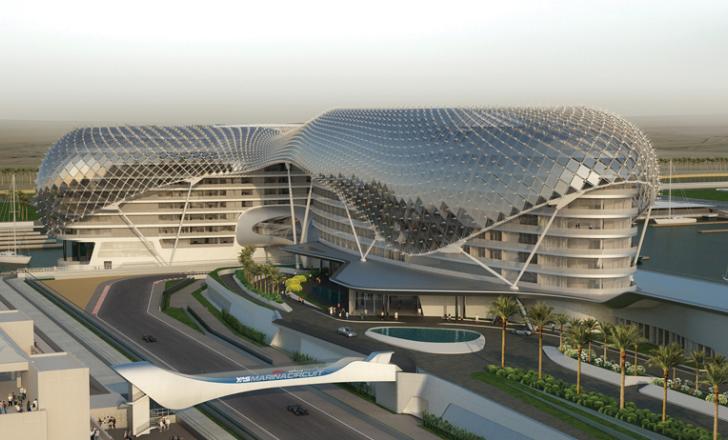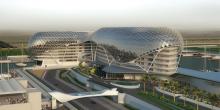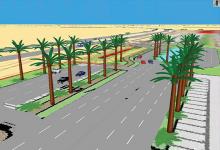More than 200 companies are preparing to take part in INTERMAT Middle East being held at the Abu Dhabi National Exhibition Centre from October 8-10 2012. Guy Woodford spoke to the ambassador of the UAE to France and senior figures in three exhibiting companies about the significance of the event and what they are looking to achieve through it.

Unveiled in 2009, The Yas Marina Circuit in Abu Dhabi is widely considered to be one of the most technologically advanced motorsport circuits on earth
More than 200 companies are preparing to take part in INTERMAT Middle East being held at the
“This will be an opportunity to present the UAE construction companies, innovations, achievements and projects, and to exchange experiences among the exhibitors,” said Al Raeesi.
“First we need to emphasise the importance and impact of infrastructure on urban, social and economic development. It is one of the most important factors in attracting investment and capital to countries. There is also a close relationship between the quality of infrastructure and standard of living of communities.
“Since the establishment of the UAE, the government has focused on developing its infrastructure through ongoing support for the establishment of road networks and power grids, water supply, telecommunications, schools, hospitals and public buildings. This has connected and provided communities with all the necessary services at the highest levels to support their stability and growth.”
With around 250 exhibitors and 7,000 international buyers set to take part, Al Raeesi is keen to stress the potential benefits for them in investing in UAE transport infrastructure projects.
“The UAE offers a wide range of incentives to investors and foreign companies interested in investing in the country, including the free flow of capital, and exemption from income tax on companies and individuals. There is also full exemption from customs duties on capital and intermediate goods in the manufacturing industries,” he said.
Promising new projects
Al Raeesi said a 2,000km railway from Jebel Ali up to the Saudi border via El Ain, which will link the GCC countries after becoming operational in 2017/2018, is among the most promising new transport infrastructure projects in the region.He added: “As well as opening new areas for the different industries and investments, it will reduce transport costs, traffic accidents and emissions of environmental pollutants.
“It is also necessary to refer to the huge investments that will be provided in the field of clean transport. ‘Masdar City’, which is established in the UAE, is the first Green City in accordance with international environmental standards, where normal cars will not be allowed. It will include a number of sustainable transport vehicle innovations to protect the environment and ensure the safety and quality of life.
“These projects and others are a primary source for attracting foreign investment in the transport sector. The UAE provides a suitable environment through ensuring security and stability and the existence of laws that encourage investments.”
Among the large number of impressive construction projects in Abu Dhabi in recent years, likely to be referred to during INTERMAT Middle East, is the Yas Marina Circuit, which hosted the final race of the 2009 Formula 1 World Championship after its opening in October 2009.
After its planning and construction involving 14,000 staff and 35 million building labour hours, Yas Marina Circuit is now widely considered to be one of the most technologically advanced circuits in the world.
Miller International (MI), a company manufacturing buckets, quick couplers and other attachments for earthmoving industries, with customers including
Jacqueline Miller, the firm’s sales and marketing director, is excited about the commercial benefits that could follow the key event.
“Recent exhibitions attended in Asia have indicated that there is a huge potential in the Middle East for our quick coupler and bucket ranges and that our innovative way of providing workable solutions can assist our customers to maximise their profitability.
“The Miller quick coupler allows you to reduce the number of machines required on a particular project. Rather than having dedicated machines to do one specific job, one machine fitted with a Miller quick coupler can quickly and easily change between different attachments to complete a variety of tasks.”
Miller says MI will be looking to meet with “key influencers” and “decision makers” from the Middle East and international companies with which the company can begin to forge good working relationships with.
“Miller currently exports approximately 60% of its turnover to North America, Europe, and Asia through a well-established distributor network. Recent economic challenges have led us to look at emerging markets to grow our exports and we have identified countries such as India and China to invest heavily in,” added Miller.
“We recognise major construction projects being completed in the Middle East over the next 20 years and believe that Miller’s 35-year experience in the industry can offer products and solutions to assist in the build of some of these projects.”
Emerging markets
On Middle East emerging markets of specific interest to MI, Miller said: “We are keen to build relationships in particular in UAE, Saudi Arabia and Qatar.“Recently, some companies based in Qatar have shown an interest in our product range. We have carried out some market research and identified Qatar as one of the largest markets for rock breakers. Miller quick couplers perform very well with demolition attachments and we have thousands of couplers working with such attachments worldwide.
“Some companies from Qatar have also show interest in setting up a joint venture bucket manufacturing facility with Miller. This is mainly for domestic consumption and exports to neighbouring countries.”
Miller added that MI has noted reports suggesting an imminent increase in construction activities in Dubai, Oman and Saudi Arabia.
Holger Amann, director of sales and service for
“Liebherr hopes to attract and meet new customers from the GCC region and to receive fresh input about new large-scale projects in the region,” says Amann.
“We are trying to reach the same sales figures in 2012 as we had in the boom years 2006, 2007 and 2008. We are focusing the Middle East since it seems to have recovered from the crisis of 2009 and 2010. Business has improved substantially since mid-2011 mainly due to large investments in the oil and gas industry, which has always been a very attractive business for our customers. The mobile crane division is doing especially well this year.”
Amann says Liebherr has a firm idea of which emerging markets the company is keen to develop commercial relationships with.
“We are focusing on UAE and Saudi Arabia. The big business in Qatar has not started yet but it is expected to start in 2013.”
Emiel Bleyenberg, chief executive of Dutch custom-build grab manufacturer TGS, believes INTERMAT Middle East ties in perfectly with its commercial strategy.
“TGS likes to promote itself in the emerging markets in the Middle East and other parts of the world, and this show seems to be an excellent platform to do so.”
%$Linker:






